#ManufacturingERP
Photo

manufacturing erp | manufacturing erp software | manufacturing management software | production erp solutions | production management software
Automate the core processes of your business with real-time visibility using our all-in-one #cloudERP that delivers operational excellence.
Source Url: https://www.matiyas.com/manufacturing-erp-software
Request our digital solutions demo: https://www.matiyas.com/request-demo
#matiyas#matiyaserpnext#simplify#simplifyyourbusiness#integratedsystems#integratederp#integratederpsoftware#manufacturing#manufacturingerp#manufacturingsoftware#manufacturingindustry#manufacturingsystem#manufacturingautomation#best manufacturing erp solutions in malaysia#kuwait#oman#india#nigeria#uae
2 notes
·
View notes
Text
#erpforleanmanufacturing#mciapps#erpforleanmanufactruing#manufacturingerp#besterpsolutionformanufacturing#enterpriseresourceplanningformanufacturing
1 note
·
View note
Text
Happy Vasant Panchami with Best ERP Software

Wishing you Happiness, God-fortune, Success, Peace & Progress on the occasion of Vasant Panchami with the best ERP Software Company {Shivit Technologies}
#erp#VasantPanchami#ERP#Software#InventoryManagementSoftware#CRM#IT#ITCompany#BestSoftware#BestCompany#Purchase&Inventory#ManufacturingERP#SupplyChainManagement#CloudERPSoftware
0 notes
Text

ERP Solution For Cold Forging and Foundries Companies: PMTrack provides high-quality ERP solutions to its customers belonging to a range of manufacturing and service industries.
Our Business Process developers’ expertise in understanding the complexities and unique challenges involved in the Sheet Metal Industries’ workflow enables us to constantly enhance our ERP software’s functionality to efficiently streamline the business processes of Sheet Metal Industries.
More Info Visit Us: https://bit.ly/3LOQ4oc
Contact No:+91-8600004221
#erpsoftware#erpsolution#erp#erpdevelopment#sheetmetalfabrication#manufacturingerp#erpsolutioninpune#erpsoftwarecompaniesindia#sheetmetalcompanies#erpforging#manufacturingindustry#sheetmetalerp#sheemetalindustries
0 notes
Text
Top ERP Software for the Manufacturing Industry
Cloudmonte Technologies specializes in delivering cutting-edge ERP software for the manufacturing industry. Our ERP solutions are designed to streamline and optimize various aspects of manufacturing processes, offering a comprehensive suite of tools to enhance efficiency and productivity.
Visit: https://cloudmonte.com/best-erp-software-for-manufacturing-industry/
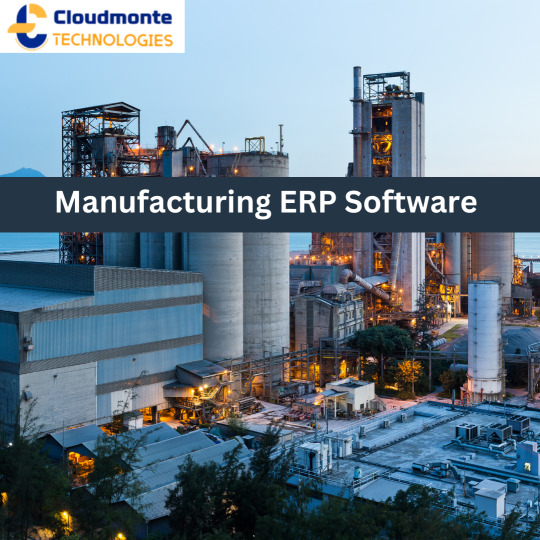
#manufacturingerp#erp#erpformanufacturing#erpsoftware#manufacturingerpsolutions#cloudmontetechnologies
0 notes
Text
ERP Software for the Manufacturing and Distribution Industry
Cloudmonte Technologies specializes in delivering cutting-edge ERP for the Manufacturing and Distribution industry. Our comprehensive solution is designed to streamline and optimize various business processes within the manufacturing and distribution landscape. With Cloudmonte's ERP software, businesses can seamlessly integrate and manage key functions such as production planning, inventory management, supply chain logistics, order processing, and financials. Our platform empowers organizations to enhance operational efficiency, reduce costs, and improve overall productivity
Visit Us: https://cloudmonte.com/manufacturing-industry/
#manufacturingerp#erpformanufacturing#erp#erpsoftwaremanufacturing#manufacturinganddistributionerp#cloudmonte#erpsystem
0 notes
Text
Inventory Management Module in Manufacturing ERP Software for the USA Business Environment
In today's fast-paced world of business, efficient inventory management is crucial for manufacturers in the USA. To streamline operations and stay competitive, many companies turn to Manufacturing ERP (Enterprise Resource Planning) software with dedicated inventory management modules. This article delves into the significance of inventory management modules in Manufacturing ERP software within the context of the USA business environment.

Inventory management is a critical aspect of manufacturing operations, especially in the competitive business landscape of the United States. Efficiently managing inventory not only helps in cost reduction but also ensures timely deliveries, better customer satisfaction, and increased profitability. In this article, we will explore how Manufacturing ERP software, specifically its inventory management modules, can revolutionize inventory control in the USA business environment.
What is Manufacturing ERP Software?
Manufacturing ERP software is an integrated solution designed to streamline and optimize various business processes within manufacturing companies. It provides a unified platform for managing functions like production planning, procurement, inventory control, order tracking, and more. The primary goal is to enhance operational efficiency and productivity.
The Importance of Inventory Management
In the manufacturing sector, inventory represents a significant portion of a company's assets. Efficient inventory management ensures that the right amount of raw materials and finished goods are available at the right time. This prevents overstocking or under-stocking, reducing carrying costs and stock-outs.
Key Features of Inventory Management Modules
Manufacturing ERP software's inventory management modules offer a wide range of features. These include:
Inventory Tracking: Real-time tracking of inventory levels.
Demand Forecasting: Predicting future demand based on historical data.
Multi-location Management: Handling inventory across multiple warehouses.
ABC Analysis: Prioritizing items based on their importance.
Barcode Scanning: Streamlining data entry and accuracy.
Supplier Management: Efficiently managing vendor relationships.
Stock Valuation: Determining the value of goods on hand.
Benefits of Using Inventory Management Modules
Implementing inventory management modules in Manufacturing ERP software brings several benefits to businesses operating in the USA:
Cost Reduction: Reduced carrying costs and minimized wastage.
Improved Efficiency: Streamlined operations and reduced manual errors.
Enhanced Customer Service: Faster order fulfillment and fewer stockouts.
Data-driven Decisions: Informed decision-making based on real-time data.
Compliance and Accuracy: Ensuring compliance with industry regulations.
Challenges and Solutions
While inventory management modules offer numerous advantages, they come with their set of challenges. These include data integration issues, user adoption, and potential implementation costs. However, with proper planning, training, and the right ERP system, these challenges can be overcome.
Integration with Other ERP Modules
Manufacturing ERP software typically consists of various modules like finance, production planning, and human resources. Integration of the inventory management module with these other modules ensures seamless data flow across the organization, leading to better decision-making and efficiency.
Customization and Scalability
Every manufacturing business is unique, and ERP systems should be customizable to meet specific needs. Scalability is also crucial, as a company's requirements may evolve over time. Manufacturing ERP software allows for customization and scalability to adapt to changing business demands.
Real-time Data Analytics
One of the most significant advantages of ERP software with inventory management modules is the ability to harness real-time data for analytics. This enables businesses to identify trends, optimize inventory levels, and make data-driven decisions for sustainable growth.
Case Study: Successful Implementation
To illustrate the benefits of inventory management modules, let's take a look at a real-life case study of a manufacturing company in the USA. This company experienced a significant reduction in carrying costs, improved order accuracy, and a 15% increase in customer satisfaction after implementing Manufacturing ERP software with robust inventory management.
Choosing the Right ERP System
Selecting the right ERP system is a critical decision for any manufacturing business. Factors to consider include the size of the company, industry-specific requirements, budget constraints, and scalability options. It's essential to conduct thorough research and possibly seek guidance from ERP consultants.
Cost Considerations
While the benefits of Manufacturing ERP software are substantial, businesses must also consider the initial implementation costs and ongoing maintenance expenses. ROI (Return on Investment) analysis is crucial to determine the long-term value.
Future Trends in Inventory Management
The landscape of inventory management is constantly evolving. Future trends may include the use of artificial intelligence for demand forecasting, blockchain for supply chain transparency, and advanced robotics for warehouse automation. Staying updated with these trends can give businesses a competitive edge.
Thus, inventory management modules within Manufacturing ERP software are indispensable tools for manufacturers in the USA business environment. They offer cost-effective solutions for streamlining operations, improving efficiency, and enhancing customer service. To stay competitive in today's market, investing in the right ERP system with robust inventory management capabilities is a strategic move.
To know more, Visit: www.adsgrill.com
0 notes
Text
ERP Software for Manufacturing
Manufacturing stands as one of the most intricate and interdependent industries, where precision, efficiency, and quality control are paramount. In the year 2023, the role of Enterprise Resource Planning (ERP) systems in manufacturing remains pivotal. These systems continue to be indispensable tools, aiding manufacturers in optimizing their operations, enhancing efficiency, and upholding rigorous quality standards.
This comprehensive article takes a deep dive into the world of ERP software solutions designed specifically for the manufacturing sector. It provides valuable insights into the top-tier tools available to streamline manufacturing processes.
The Role of ERP in Modern Manufacturing
The introduction section sets the stage by explaining the pivotal role of ERP systems in modern manufacturing. It highlights how these systems serve as the backbone of manufacturing operations, ensuring seamless coordination and efficiency across various departments. The section also emphasizes the critical importance of implementing ERP software in manufacturing for sustaining competitiveness and operational excellence.
Benefits of Implementing ERP Software in Manufacturing
This section elaborates on the tangible benefits that manufacturers can accrue by adopting ERP systems. It delves into areas such as improved production planning, optimized inventory management, and rigorous quality control. These benefits serve as a compelling rationale for manufacturers to explore ERP solutions for enhancing their operations.
Key Features to Consider
In manufacturing, precision is everything. This section provides a meticulous examination of the key features within ERP systems that are essential for effective manufacturing operations. It identifies and elucidates features such as production planning, inventory management, quality control, and more, ensuring manufacturers have a comprehensive understanding of what to look for in an ERP solution.
Top ERP Software Solutions for Manufacturing in 2023
Now, let's dive into an in-depth exploration of the top ERP software solutions tailor-made for the manufacturing industry in 2023. These ERP systems have been carefully selected based on their ability to address the unique needs and challenges faced by manufacturers. Below, you'll find a comprehensive overview of each featured ERP solution:
SAP S/4HANA Manufacturing: Renowned for its scalability and comprehensive manufacturing functionalities, SAP S/4HANA Manufacturing is a powerhouse ERP system. It offers manufacturers the tools they need to manage complex production processes, optimize resource allocation, and ensure the highest levels of quality control. Its robust features make it suitable for both large and growing manufacturing businesses.
Microsoft Dynamics 365 Supply Chain Management: Seamlessly integrating with Microsoft's ecosystem, Microsoft Dynamics 365 Supply Chain Management streamlines manufacturing operations within a familiar environment. This ERP solution enhances data sharing, simplifies collaboration, and improves overall productivity. Manufacturers already utilizing Microsoft tools will find this integration particularly advantageous.
Infor CloudSuite Industrial (SyteLine): Infor CloudSuite Industrial (formerly known as SyteLine) is renowned for its industry-specific capabilities and adaptability. It offers manufacturers a tailored approach to ERP, addressing their unique challenges and needs. Whether it's managing complex supply chains or ensuring efficient production scheduling, Infor CloudSuite Industrial has the expertise to excel in the manufacturing sector.
Plex Systems: Specializing in manufacturing ERP solutions, Plex Systems is dedicated to optimizing production processes. It provides manufacturers with a comprehensive suite of tools for production planning, inventory management, and quality control. Plex Systems' expertise in manufacturing ensures that it caters specifically to the needs of this industry, making it a powerful choice for manufacturers aiming to boost efficiency and quality.
Epicor ERP: Epicor ERP offers industry-specific solutions for manufacturing and distribution industries. Its extensive feature set covers everything from inventory management to financials, making it a versatile choice for manufacturers looking to address their unique challenges. Epicor ERP is known for its ability to adapt to the evolving needs of manufacturers, ensuring long-term relevance.
Odoo: Odoo is a versatile, open-source platform that provides manufacturers with modular functionality. This flexibility allows manufacturers to customize the system to their specific requirements. Odoo's modular approach empowers manufacturers to select and integrate only the modules they need, ensuring a tailored ERP solution.
ERPNext: ERPNext is an open-source ERP system designed with manufacturing in mind. It offers features for production planning, inventory management, and quality control. Its user-friendly interface and cost-effective nature make it a compelling choice for small and medium-sized manufacturers.
Each of these ERP systems brings a unique set of features and strengths to the manufacturing landscape. As we delve deeper into the article, we'll provide detailed comparisons, enabling you to make an informed decision based on your manufacturing business's specific needs and objectives.
To provide tangible evidence of the impact of these ERP solutions, this section includes real-world success stories and case studies. These narratives showcase how actual manufacturers achieved operational excellence and efficiency through the implementation of ERP systems. Real-life examples serve as powerful testimonies to the transformative potential of ERP in manufacturing.
Strategies for Implementation
Selecting the right ERP system is just the beginning; effective implementation is equally vital. This section offers a roadmap of best practices for successfully implementing and integrating ERP systems into manufacturing processes. It covers critical aspects such as data migration, user training, and change management strategies.
Overcoming Challenges
The path to ERP implementation is not without challenges, particularly within the manufacturing sector. This section identifies common hurdles faced during implementation and provides strategies and solutions for overcoming them. It addresses challenges such as data security, process disruption, and integration complexities specific to manufacturing.
Conclusion
In the concluding section, the article revisits the key takeaways and underscores the critical importance of selecting the right ERP system for manufacturing in 2023. It reinforces the notion that this decision isn't just about software; it's a strategic move that can redefine how manufacturers operate and compete in an ever-evolving industry landscape.
By the conclusion of this comprehensive guide, readers gain a profound understanding of the top ERP solutions available for the manufacturing industry. They are empowered to make well-informed decisions that can elevate their manufacturing processes and enhance their competitiveness in 2023 and beyond.
#erpsystemformanufacturing#erpformanufacturing#manufacturingerpsystem#besterpformanufacturing#erpforsmallmanufacturingbusiness#erpformanufacturingcompany#erpforcustommanufacturing#manufacturingerpsoftware#erpsystemsforsmallmanufacturers#bestmanufacturingerpsoftware#erpmanufacturing#erpformanufacturingindustry#manufacturingerp#manufacturingindustries#manufacturingindustry#opensourcemrpsoftware#besterpsoftwareformanufacturing#benefitsoferpformanufacturingindustry#manufacturingerpmodule
1 note
·
View note
Text
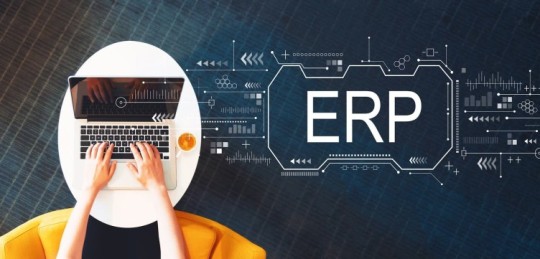
Are You Looking Best ERP Software?
Introduction
In today's fast-paced business environment, having the right tools and systems in place is crucial for success. When it comes to managing and optimizing business processes, Enterprise Resource Planning (ERP) software plays a pivotal role. ERP solutions integrate various departments and functions within an organization, allowing for efficient data sharing, streamlined workflows, and improved decision-making.
Finding the best ERP software for your specific business needs can be a daunting task, considering the plethora of options available in the market. In this article, we will dive deep into the world of ERP systems and help you navigate through the complexities to find the perfect fit for your company. From understanding the benefits of ERP to exploring the top LSI keywords, this guide has got you covered.
What is ERP Software?
In simple terms, ERP (Enterprise Resource Planning) software is an integrated suite of applications designed to manage and automate core business processes such as finance, human resources, inventory, sales, and more. By centralizing these functions into a single platform, ERP software provides a comprehensive view of the organization's operations, enabling data-driven decision-making and boosting overall efficiency.
The Benefits of ERP Software
Improved Efficiency: With ERP software, manual and repetitive tasks are automated, reducing the chances of errors and saving valuable time for employees to focus on more strategic initiatives.
Streamlined Workflows: ERP streamlines business processes by eliminating data silos and facilitating seamless communication between departments, leading to faster and more accurate information flow.
Enhanced Reporting and Analytics: ERP systems offer robust reporting and analytics capabilities, providing real-time insights into key performance indicators (KPIs) for better decision-making.
Better Customer Service: ERP software enables businesses to deliver better customer service by providing a 360-degree view of customer interactions, allowing for personalized and timely responses.
Cost Savings: By optimizing processes, reducing manual intervention, and minimizing inventory carrying costs, ERP software can result in significant cost savings over time.
Scalability: A good ERP solution is scalable and can adapt to the changing needs of a growing business, ensuring long-term viability.
Key Features to Look for in ERP Software
When evaluating ERP software options, it's essential to consider the following key features:
1. Customization and Flexibility
Your business is unique, and your ERP solution should be too. Look for software that allows customization to meet your specific business needs and is flexible enough to adapt as your requirements evolve.
2. Integration Capabilities
The ERP system should seamlessly integrate with your existing software and applications to ensure smooth data flow across the organization.
3. User-Friendly Interface
A user-friendly interface is critical for successful ERP implementation. The system should be intuitive and easy to navigate for all employees.
4. Mobile Accessibility
In today's mobile-driven world, having mobile accessibility is a significant advantage. Look for ERP software that offers mobile apps or responsive interfaces.
5. Security and Data Protection
Data security is paramount. Ensure that the ERP software has robust security features and compliance with data protection regulations.
6. Scalability and Growth Potential
Consider the ERP system's ability to scale and support your business growth in the future without significant disruptions.
7. Customer Support and Training
Reliable customer support and comprehensive training resources are vital for a smooth ERP implementation and ongoing usage.
8. Cloud vs. On-Premises
Evaluate the pros and cons of cloud-based ERP solutions versus on-premises installations based on your business requirements and preferences.
9. Industry-Specific Functionality
Some ERP software is tailored for specific industries. If available, opt for an industry-specific solution that aligns with your business vertical.
10. ERP Data Migration Tools
If you are transitioning from an older ERP system, ensure that the new software offers data migration tools to facilitate a seamless shift.
Top 5 ERP Software Solutions in the Market
Are You Looking Best ERP Software
4ERP
AcmeERP is a leading ERP software trusted by thousands of businesses worldwide. It offers a robust suite of features, including financial management, inventory control, human resources, and customer relationship management. With its user-friendly interface and scalable architecture, AcmeERP is an ideal choice for small to mid-sized enterprises.
Are You Looking Best ERP Software? Look no further than AcmeERP, as it ticks all the boxes for a reliable and feature-rich ERP solution.
MyBusinessSuite
MyBusinessSuite is a cloud-based ERP system designed to streamline business operations and improve overall efficiency. It caters to various industries and comes with a range of modules, including accounting, supply chain management, and project tracking. Its mobile accessibility and real-time reporting make it a preferred choice for modern businesses.
Are You Looking Best ERP Software? MyBusinessSuite is worth considering for its cloud-based approach and comprehensive functionality.
EnterpriseXpert
EnterpriseXpert is an industry-specific ERP software tailored to meet the unique needs of manufacturing companies. It offers advanced production planning, quality control, and supply chain management tools, making it an excellent option for manufacturers.
Are You Looking Best ERP Software? EnterpriseXpert specializes in empowering manufacturers with data-driven insights and process optimization.
AxizERP
TradeMaster is an all-in-one ERP solution for businesses in the wholesale and distribution sector. It covers inventory management, order processing, and financials, enabling seamless operations for wholesalers and distributors.
Are You Looking Best ERP Software? TradeMaster caters specifically to wholesale and distribution businesses, making it a compelling choice in its niche.
ServicePro
ServicePro is a comprehensive ERP software designed for service-based businesses. It offers modules for project management, service ticketing, and billing, making it ideal for professional service firms.
Are You Looking Best ERP Software? ServicePro stands out for its focus on service-oriented industries, providing tailored solutions for service businesses.
Are You Looking Best ERP Software? - FAQs
Q: What Is the Cost of ERP Software?
The cost of ERP software varies widely based on factors such as the size of your business, the number of users, and the features required. While some ERP solutions offer subscription-based pricing, others may charge a one-time licensing fee. It's essential to get customized quotes from vendors and evaluate the return on investment (ROI) before making a decision.
Q: Can ERP Software Improve Data Accuracy?
Yes, ERP software can significantly improve data accuracy by centralizing information and reducing manual data entry. With real-time data updates and automated processes, the chances of errors and discrepancies are minimized, leading to better decision-making and reliable reporting.
Q: Is Cloud-Based ERP Better Than On-Premises?
Both cloud-based and on-premise ERP solutions have their advantages and disadvantages. Cloud-based ERP offers greater flexibility, scalability, and accessibility from anywhere with an internet connection. On the other hand, on-premises ERP provides complete control over data and infrastructure but requires more significant upfront investments.
Q: How Long Does It Take to Implement ERP Software?
The implementation timeline for ERP software can vary based on the complexity of your business processes and the level of customization required. On average, ERP implementation can take anywhere from a few months to a year. It is crucial to work closely with the ERP vendor and have a detailed implementation plan in place.
Q: Can ERP Software Support Mobile Devices?
Yes, many modern ERP solutions offer mobile accessibility through dedicated mobile apps or responsive web interfaces. This enables employees to access critical information and perform tasks on the go, increasing productivity and efficiency.
Q: How Does ERP Benefit Small Businesses?
For small businesses, ERP software can be a game-changer. It centralizes operations, enhances communication, and provides valuable insights for smarter decision-making. Small businesses can benefit from streamlined workflows, reduced operational costs, and improved customer service, helping them compete with larger enterprises.
Conclusion
In conclusion, choosing the best ERP software is a critical decision that can significantly impact your business's success. By understanding your specific needs, evaluating key features, and exploring top ERP solutions like AcmeERP, MyBusinessSuite, EnterpriseXpert, TradeMaster, and ServicePro, you can find the perfect fit for your organization.
Remember to consider customization options, integration capabilities, user-friendliness, security features, scalability, and industry-specific functionality when making your decision. And don't forget to explore both cloud-based and on-premises options to determine what aligns best with your business goals.
Are you looking for the best ERP software? Now armed with the knowledge from this guide, you are ready to make an informed choice that will drive your business towards greater efficiency and success.
#erpsoftwaresolutions#softwaredevelopment#erpsolutions#erpsystem#erpsoftware#cloudbasederp#erpimplementation#ERPSoftware#EnterpriseResourcePlanning#BusinessManagement#CloudERP#ERPImplementation#ERPSolutions#ERPIntegration#ERPModules#ERPVendors#ERPBenefits#ERPFeatures#SmallBusinessERP#ManufacturingERP#FinanceERP#HRERP#SupplyChainERP#ERPAnalytics#MobileERP#ERPConsulting#OpenSourceERP#ERPUpgrades#ERPMaintenance#ERPforBusiness
1 note
·
View note
Text
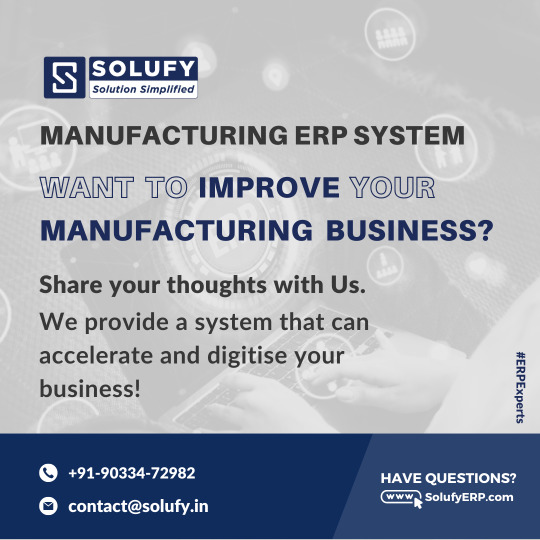
𝗠𝗮𝗻𝘂𝗳𝗮𝗰𝘁𝘂𝗿𝗶𝗻𝗴 𝗘𝗥𝗣: 𝗠𝗮𝘅𝗶𝗺𝗶𝘇𝗲𝘀 𝘆𝗼𝘂𝗿 𝗯𝘂𝘀𝗶𝗻𝗲𝘀𝘀 𝗣𝗿𝗼𝗱𝘂𝗰𝘁𝗶𝘃𝗶𝘁𝘆 𝗮𝗻𝗱 𝗣𝗿𝗼𝗳𝗶𝘁𝗮𝗯𝗶𝗹𝗶𝘁𝘆
In the manufacturing industry business processes are more efficient and automated by leveraging Manufacturing ERP Systems. Manufacturing companies benefit from ERP software because it automates all processes, reduces manual work, and improves collaboration to achieve long-term success.
#Manufacturing#ManufacturingERP#ManufacturingIndustry#ManufacturingERPSoftware#SupplyChain#Automanufacturing#PharmaManufacturing#ERPSolutions#ERPNext#SolufyERP#🧑🏭 Manufacturing ERP System | ERP software for manufacturing industry - Solufy ERP#https://bit.ly
0 notes
Text


Optimize your production planning in the manufacturing line with #ERPNext! From scheduling and resource allocation to dynamic charts and reports, the solution empowers you to streamline operations and drive efficiency at every stage. Say hello to smarter production decisions and enhanced productivity with Matiyas Solutions.
#ManufacturingERP#ProductionPlanning#Efficiency#erpnext#frappe#erpnextserviceprovider#erpsolutions#Erpformanufacturing#erpsoftware#erpformanufacturingindustry#ContinuousImprovement#matiyassolutions#erp
0 notes
Text
Mx-ERP Software For Edible Oil Manufacturers - All You Need To Know
For any business or industry, ERP software is essential to running day-to-day operations. Oil and edible oil manufacturers are no exception - even though trends may change with time. In this blog article, we will explore what ERP software is, the different types available for Oil and Edible Oil Manufactures, why oil and edible oil manufacturers need ERP software, and finally how it can be a significant asset to your company.
What is ERP Software?An
ERP software system
for edible oil manufacturers typically contains a number of modules that cover different areas of the business. The most common modules in an ERP software system are:
Accounting and finance
Sales and marketing
Manufacturing and production
Human resources
Supply chain management
Each module is designed to manage a specific area of the business, and they all work together to provide an integrated view of the business. This means that information can be easily shared between departments, and decision making is based on accurate, up-to-date data.
Why do Manufacturers of Edible Oil Need ERP Software?There are many reasons why manufacturers of edible oil need ERP software. One reason is that ERP software can help manage the production process more effectively. By tracking every aspect of the production process, from raw materials to finished products, manufacturers can ensure that each batch of edible oil meets quality standards. In addition, ERP software can help identify bottlenecks in the production process and optimize resources to improve efficiency.
Another reason why manufacturers of edible oil need ERP software is that it can help track inventory levels and forecast future demand. This is critical for managing the supply chain and ensuring that there is enough inventory on hand to meet customer demand. Additionally, ERP software can provide visibility into the sales pipeline, so manufacturers can better plan production based on expected customer demand.
Finally,
ERP software
can help manufacturers of edible oil comply with food safety regulations. By tracking all aspects of the production process, from raw materials to finished products, manufacturers can ensure that they are meeting all required standards. Additionally, ERP software can generate reports that help identify areas where improvements are needed to ensure compliance with food safety regulations.
What are the Benefits of Using ERP Software?There are many benefits of using an ERP software system for an edible oil manufacturer. Perhaps the most obvious benefit is the ability to manage all aspects of the manufacturing process in one central system. This can save a great deal of time and money by reducing or eliminating the need for multiple, disparate software systems.
In addition, an ERP system can provide real-time visibility into every aspect of the manufacturing process. This can help identify issues and bottlenecks early on before they cause significant disruptions. Additionally, this visibility can help optimize the manufacturing process, leading to increased efficiency and productivity.
Other benefits of using an ERP software system for an edible oil manufacturer include improved quality control, reduced inventory costs, and streamlined customer service. By managing all aspects of the business in one central system, manufacturers can more easily ensure that quality standards are being met and that inventory levels are accurate. This can lead to significant cost savings over time. And finally, by integrating customer service into the ERP system, manufacturers can provide a faster and more efficient experience for their customers.
How to Choose the Best ERP Software for Edible Oil ManufacturersAs an edible oil manufacturer, you know that there are a lot of moving parts to your business. From sourcing the raw materials to processing and packaging the finished product, there is a lot to keep track of. That's why having a good ERP system in place is so important.
But with so many options on the market, how do you choose the best ERP software for your business? Here are a few things to keep in mind:
Scalability: As your business grows, you'll need an ERP system that can scale with you. Make sure to choose a platform that can handle your current and future needs.
Industry-Specific Functionality: Edible oil manufacturing has unique requirements, so you'll want to make sure that the ERP system you choose has industry-specific functionality. Look for a platform that offers features like recipe management and traceability.
Integration: A good ERP system should be able to integrate with your existing systems and data sources. This will make it easier to get up and running, and will ensure that your data is accurate and up-to-date.
Support: When choosing an ERP system, be sure to consider the level of support offered by the vendor. You'll want to make sure that there is someone available to help you if you run into any problems.
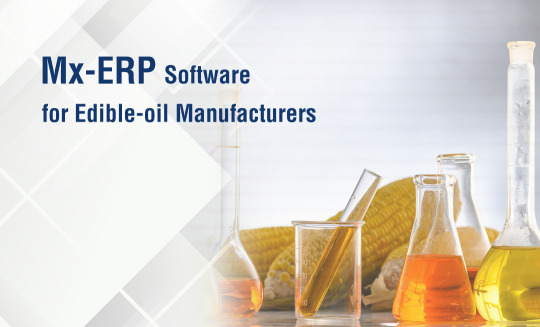
0 notes
Text
https://www.tranquilbs.com/problems-manufacturing-industry/
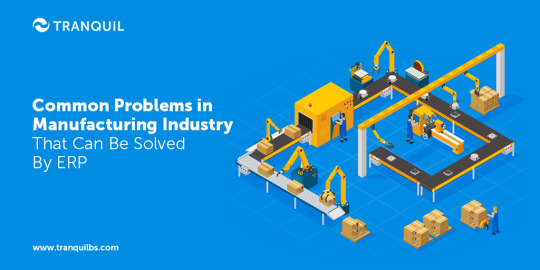
What are the common problems in manufacturing industry? Data Collection Errors, Incorrect Reporting, Integration of Operations and Locations, Proper Inventory Control, Optimum Resource Utilization etc. How an ERP can help to solve them? Let us find out the complete problems and their solutions here.
#erpsolution#tranquil#manufacturing#manufacturingerp#manufacturingproblems#businesssoftware#manufacturingissues#problemsinmanufacturingindustry#gcc#erp#problemsfacingmanufacturingindustries
1 note
·
View note
Text

#erpsoftware#erpsolution#erp#erpdevelopment#sheetmetalfabrication#manufacturingerp#erpsolutioninpune#erpsoftwarecompaniesindia#sheetmetalcompanies#erpforging#manufacturingindustry
0 notes
Text
issuu
#erp#erpsoftware#manufacturingerp#besterpsoftware#top10erpsoftware#corporatemunim#erpsoftwaredevelopment#enterpriseresourceplanning#erp in ahmedabad#erpinahmedabad#erp software
0 notes
Text
ERP Software in Bangalore
Roadmap offers its ERP software in Bangalore and is the best ERP in Bangalore The ERP Company, in Bangalore,Cloud based ERP in Bangalore,Web based ERP in Bangalore and Manufacturing ERP in Bangalore is the most preferred ERP software Company in Bangalore.
https://roadmapit.com/erp-software-in-bangalore
0 notes